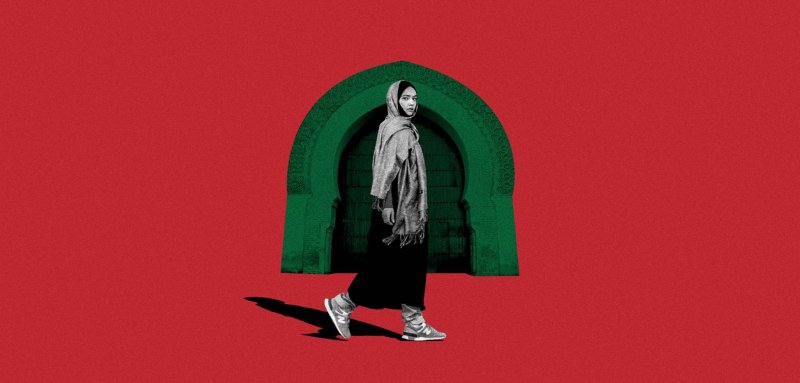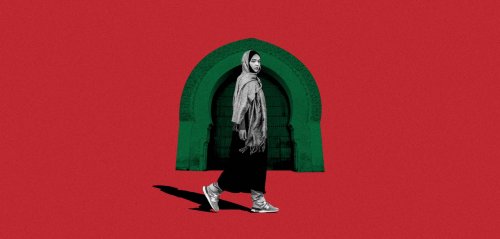The stereotypical image of a married Moroccan woman is that she is traditional, obedient, robot line in her routine life, weak and lacking control over her life; her days are occupied with cleaning, vacuuming, changing diapers, and fulfilling the desires of her husband. On the other hand, some married women look at single women as living an empty, unstable life, devoid of purpose – while others view their decision to marry as having given up on their dreams.
A Time Bomb
"I feel that I am one of many women who live in misery, but unable to say it – or rather, we do not admit the scale of the error that we committed. I ask every day: Am I a maid? My hours are divided between cooking, washing, cleaning and fulfilling the wishes of my husband's family during the day, and fulfilling the wishes of my husband at night."
So says 29-year old Najwa al-Hafyan, a housewife and mother of two from Casablanca: "I am like many other housewives who are suffering in silence, I feel that the wheels of life have stopped turning. Life after marriage has become routine and boring, I feel embarrassed of myself when I see others completing their education, achieving their dreams and having their own self-control over their life decisions."
Al-Hafyan points out that following years of marriage, she now lacks the moments of happiness that she used to experience in the early days of married life, with the onset of boredom, problems and calculations, transforming life into a "time bomb that can explode at any moment."
Meanwhile 30-year old Khadija Lamnawar, also from Casablanca and a housewife and mother of a single daughter, tells Raseef22: "I wish that I could go back in time, so that I correct the mistake I committed against myself when I decided two years ago to marry – for the idealistic image I had in my mind about married life and the institution of marriage soon evaporated after a short period of marriage, when I found that reality wasn't like I dreamed. After the first week of marriage you get the feeling that nothing has changed in your life, other than that you've become a maid, especially if you have no financial independence."
Self Realization
According to a recent report by the Moroccan Higher Planning Commission (HCP), a significant demographic change has taken place in Morocco, with the age of first marriage for female city dwellers increasing from an average of 17 in 1960 to 27 in 2004.
For women, the average age changes according to circumstances, especially economic conditions.
After the first week of marriage you get the feeling that nothing has changed in your life, other becoming a maid, especially if you have no financial independence. Khadija on marriage in #Morocco
Urban women are more likely to postpone their marriage plans, with their priorities lying in achieving their personal fulfillment and financial independence; accordingly, they prefer to continue their education and work, according to the HCP's report.
The Rise of Liberation Discourse
Researchers have argued that Moroccan society has begun to accumulate a range of social and economic changes, as well as changes to the criteria that define values, which opened the door to the rise of a "liberation discourse", based on the argument that when a person is single they have freedom of choice, especially amongst young women who have are increasingly rejecting marriage.
A significant demographic change has taken place in Morocco, with the age of first marriage for female city dwellers increasing from an average of 17 to 27 over last 45 years.
Accordingly, Amal Shabash, a specialist in psychological and sexual therapy, told Raseef22: "What is noticeable is that the mentality of the Moroccan woman has today changed, whereby she sees life from a modernist perspective that differs from traditional women, who used to revere the institution of marriage and make it a life priority; today, we find that young women are no longer tied to ideas that make women dependent on men, from the basis that the "man is the head-covering of the woman", and that the "husband is support", and other expressions that tie women to men."
A Desire Slave?
Inherited concepts continue to circulate within Moroccan society, such as praising the early marriage of a woman, while a woman is often viewed in many circles to be incomplete if she is not reinforced by a husband.
Halima Arbash, a housewife and mother of three children, agrees relatively with these inherited ideas, telling Raseef22: "I used to hear my mother and grandmothers say that marriage is a shelter for women, and in marriage I found my stability; I am happy with my husband, I found in him my family, I take care of my children and husband. It is true that there are inevitably problems and bumps on the road between a wife and a husband, but I believe that a woman must have a partner and must establish a family, by contrast to the single life where the person, whether man or woman, remains scattered with no partner in life."
Arbash is opposed by 33-year old Ahlam al-Riki, an accountant who told Raseef22: "Is it possible that these conceptions are still repeated today, how can it be that there are women who still believe in these concepts regarding marriage, and accept them, when it is these concepts that justify the total subjugation of a woman to her husband whatever the circumstances or situations, leaving her weak and subjugated her entire life."
Al-Riki continues: "I cannot constrain my freedom, and change the pattern of my life by being in a single cage with a man, cooking, washing and satisfying his sexual desires."
Al-Riki continues that "the freedom of woman is the basis of her life, without being controlled by a man or having an imposition to obey his commands, and I believe that a woman who accepts for herself to be an affiliate of a man will always have a weak personality throughout her life."
Similarly, Jamila al-Faqir, a bank employee, believes that her freedom and independence are above all other considerations, and that what is circulated regarding married life does not encourage her to change her choice. She tells Raseef22: "It is true that us single women are looked down upon but at least we own ourselves, decisions and lives. Also, I do not want to marry simply so they do not call me a spinster or old maid."
Shabash believes that young women today have more important interests, such as seeking personal fulfilment through raising their educational levels and obtaining a certain employment position; in other words, to achieve a personal, moral and financial independence so that she does not become a subsidiary [dependent] of a man.
Fatima al-Qadiri, 26 years of age and a hotel employee from the city of Mohammedia south of Casablanca, advises Moroccan women to travel and enjoy life instead of thinking of marriage, saying: "For me personally the idea of marriage is postponed to an indefinite date, I am amongst those who love life and try to enjoy it as much as possible, and am not prepared to shackle it at an early time in a marriage where you could find all your needs and achieve your dreams or you could not; thus I tell all young women whose lives are put on hold waiting for the knight of their dreams to accumulate money and travel in order to see life from a different and larger angle, one which surpasses the four walls of the "house of obedience", in which a woman is subordinated and a dependent of a man, who might not qualify as a man in the first place.”
Raseef22 is a not for profit entity. Our focus is on quality journalism. Every contribution to the NasRaseef membership goes directly towards journalism production. We stand independent, not accepting corporate sponsorships, sponsored content or political funding.
Support our mission to keep Raseef22 available to all readers by clicking here!
Interested in writing with us? Check our pitch process here!






